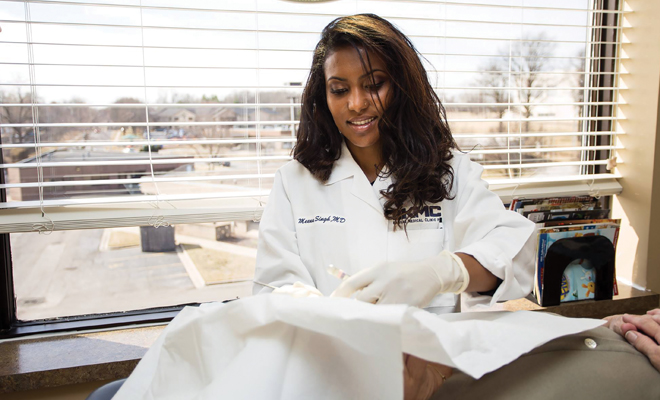
Effective Treatment for Hair Loss
Q: Why is my hair thinning?
A: The most common causes of hair thinning are telogen effluvium and androgenetic alopecia. With telogen effluvium, the hair sheds excessively and can be caused by a number of factors including thyroid abnormalities, iron deficiency, nutritional deficiencies, hormone changes, medication changes and/or severe stress. Typically, if the inciting factor is corrected, the hair will start to grow back within 6 to 12 months. If it is not improving, see a dermatologist for further workup.
Androgenetic alopecia is a form of chronic hair loss. The diameter of the hair shaft decreases over time on the top and crown of the scalp. It can continue to thin until hair loss is irreversible. Men can experience hairline recession. Because of the chronic nature of this entity, treatment should be sought with the help of a dermatologist.
Q: What are my treatment options for hair loss?
A: The goal of treatment is to not only slow down the ongoing hair loss, but also to help re-thicken the hair. Our most common treatment options include a combination of topical, oral and procedural methods. I usually recommend minoxidil applied topically daily. In addition, I address the hormonal influence of hair loss with medications such as spironolactone or finasteride. Laser light stimulation devices can help thicken the hair. I also provide platelet-rich plasma growth factor injections, as well as hair transplantation. Platelet-rich plasma injections can help stimulate thinning hairs, while hair transplantation can help replace hair in areas where there has been irreversible balding. ■
Written by: Dr. Meena Singh
Dr. Meena Singh is a board-certified dermatologist and dermatologic surgeon. She attended Harvard Medical School, trained at the Mayo Clinic, and completed a surgical fellowship in New York City. From there, she trained in Mohs micrographic surgery. Upon completing a fellowship with the International Society for Hair Restoration Surgery under world-renowned surgeon Dr. Marc Avram, Dr. Singh trained in all areas of hair transplantation techniques including strip excision, manual/motorized/robotic follicular unit extraction as well as transplanting into scarring alopecias. Dr. Singh has performed clinical trials in laser hair stimulation and studies in hair transplantation for scarring and non-scarring forms of hair loss.










